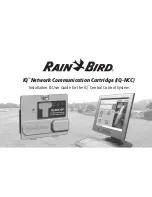
This machine is destined exclusively for the use for which it has been designed and
the manufacturer accepts no responsibility for damage incurred
Repairs should only be performed by qualified personnel at assistance centres
authorised by the manufacturer.
The product must be disposed of in compliance with local environmental
regulations and not as household waste.
For any doubts, contact your local waste collection company.
2. Technical data
Type
Number of transmission
channels
Carrier frequency
Modulation
Class
Maximum transmitter output
power
Band width
Duty cycle
Power supply voltage
Operating voltage
Estimated lifetime of the
batteries
Display
Visualization
Display dimensions
Encoding
Independent codes
Absorption in standby
Absorption in transmission
Keypad
Transmission distance
Dimensions
Weight
Any information reported in this table is not binding and may be susceptible to variations without notice.
5
This machine is destined exclusively for the use for which it has been designed and
the manufacturer accepts no responsibility for damage incurred
Repairs should only be performed by qualified personnel at assistance centres
authorised by the manufacturer.
The product must be disposed of in compliance with local environmental
regulations and not as household waste.
ontact your local waste collection company.
Multi-channel radio remote control with
microprocessor
30
433.92 MHz
OOK (On-Off Kejing)
1
< 1mW
433,05-434,79 MHz
< 1%
2 1.5V batteries - type AAA alkaline
1.8V - 3.3V
> 2 years
(assuming an average
day)
LCD (liquid crystal display)
2 digits
(selected channel)
;
Battery charge status indicator;
Transmission status;
Specific function letters
18.5x13.5 mm
HCS301
>18 x 10^18 “rolling code” combinations
< 1 µA
< 20 mA
Operational control (
UP
ARROW
STOP
)
;
2 Function buttons (
F1
,
F2
);
1 Memory button (
M
);
1 Channel button (
CH
);
50 m –
(with charged batteries)
145x38.5x22.5
76 g
Any information reported in this table is not binding and may be susceptible to variations without notice.
This machine is destined exclusively for the use for which it has been designed and
the manufacturer accepts no responsibility for damage incurred by improper use.
Repairs should only be performed by qualified personnel at assistance centres
The product must be disposed of in compliance with local environmental
ontact your local waste collection company.
channel radio remote control with
alkaline
(assuming an average use of 1 minute per
;
Battery charge status indicator;
>18 x 10^18 “rolling code” combinations
ARROW
,
DOWN
ARROW
,
);
(with charged batteries)
Any information reported in this table is not binding and may be susceptible to variations without notice.
6
3. Technical and constructional information
The
PIK
radio remote control transmits radio waves at the frequency of 433.92
MHz. It has a protocol that changes its code at each transmission
(rolling code)
according to a predetermined algorithm with a total of over 18 x 10^18 possible
combinations.
30 Direct transmission channels
(from 01 to 30)
. With the F1 and F2 functions
implemented, there can be as many as 90 control outputs for specific
transmission processes.
The command issued can be received by an electrical appliance equipped with a
receiver of the same nature which has already been set up for reception.
The casing is constructed in recyclable thermoplastic material (PC-ABS -
(Polycarbonate-Acrylonitrile Butadiene Styrene)
) which is particularly shock
resistant.
The batteries are enclosed by a snap door.
Powered by 2 AAA alkaline 1.5V
batteries. (The radio remote control works
with voltages from 1.8V
to 3.3V
).
Provided with a liquid crystal display and silicone control keypad.
The “free-field” transmission distance covers a sphere with a radius of 50 m.
4. ID plate and marking data
PIK
remote controls have CE marking and comply with the Standards listed in the
Declaration of Conformity.
The plate data is displayed on an adhesive label placed on the outside of the casing,
which must remain intact and visible.
The main information it displays includes: manufacturer's address, product name -
model number, technical characteristics, production date and serial number.
In the event of a complaint, please indicate the serial number (SN) displayed on the
label.
An explanation of the symbols used on the label to abbreviate the technical
characteristics is given in the table in the chapter on “TECHNICAL DATA”.
5. Instructions for start-up
T
HESE INSTRUCTIONS ARE INTENDED FOR TECHNICAL AND SPECIALIZED PERSONNEL
.
T
HUS BASIC SAFETY AND WORKING TECHNIQUES ARE NOT DISCUSSED
.
Standby state
When the batteries are inserted, the radio remote control goes into a standby
state; the display is off and the microprocessor is in the power down state, so the
entire device is in a state of very low consumption.
The radio remote control returns to this state whenever 30 seconds have passed
since the last button was pressed.
























